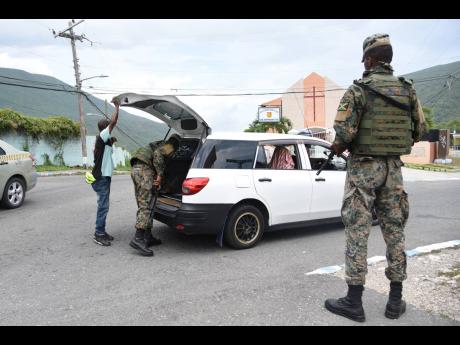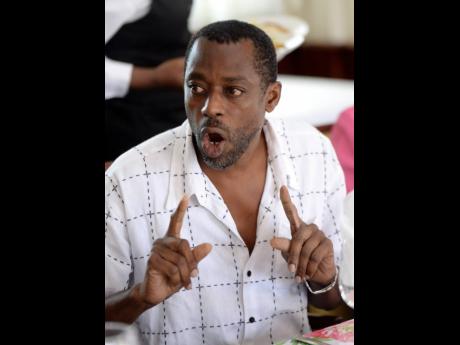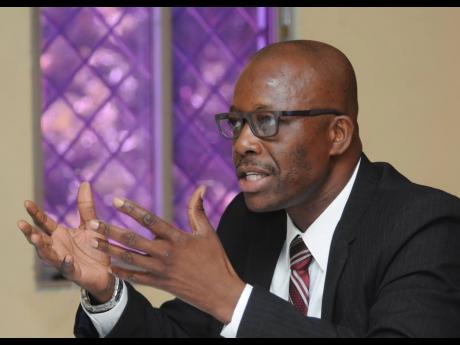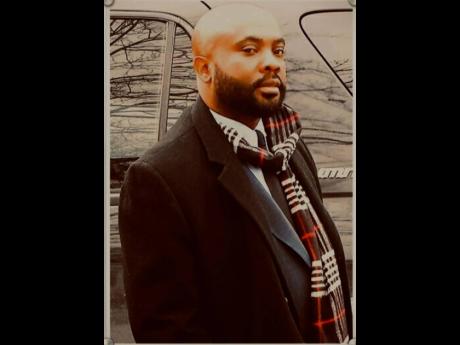OFF TARGET - Cops urged to refocus cross hairs in crime fight; gun amnesty a retrograde step, says criminologist
Two highly rated Jamaican criminologists have thrown cold water on the Government’s latest gun amnesty initiative and are calling for a rethink of the current strategies employed by the security forces, if Jamaica is to see a reduction in serious crimes any time soon.
The national firearm recovery reward programme, ‘Stop the Killing … Get the Guns’, which is being managed by the Ministry of National Security, doles out $150,000 for information leading to the recovery of high-powered rifles and machine guns; $100,000 for automatic or semi-automatic pistols and shotguns; and $75,000 for revolvers.
According to Dennis Brooks, senior communication strategist in the Jamaica Constabulary Force (JCF), 560 illegal guns have been recovered across the 19 police divisions between January 1 and November 28, 2020, an 11 per cent decline to the 620 seized over the corresponding period last year.
The St James police division leads with 101 illegal guns seized, almost twice as many as St Andrew South, which comes in next with 58 recoveries.
There is also a noticeable increase in the number of rifles being taken off the streets, with 43 recovered up to the end of last month, as opposed to 34 last year.
Sunday Gleaner attempts to get comments from National Security Minister Dr Horace Chang and the minister without portfolio in the security ministry, Matthew Samuda, were unsuccessful.
An interview with newly appointed senator and opposition spokesman on national security, Peter Bunting, also did not materialise, but head of the police’s Area One, Assistant Commissioner of Police (ACP) Clifford Chambers credited partnerships forged between the residents and the police in communities, through initiatives under the Community Safety and Security Branch, for the successes in arms recovery and the decline in serious crimes in western Jamaica, for the first three quarters of 2020.
For the period January 1, 2020 to October 31, 2020, all the western parishes, except for Hanover, saw significant declines in major crimes when compared to 2019.
However, Dr Herbert Gayle, a social anthropologist and lecturer at The University of the West Indies (UWI), and his US-based counterpart Richard Lindo, believe crime-fighting in Jamaica requires a more robust and proactive approach.
“An initiative like the gun amnesty is what we describe as top-layered or reactive strategies rather than foundational or formative strategies. Every time you look at addressing violence, you will have to look at primary, secondary and tertiary, but the more tertiary things you do, the less you will achieve,” Gayle told The Sunday Gleaner last Friday.
“The primary approach will take time and might not be ready for the next election, because it’s medium to long term and requires a shift in culture. And it does require a certain amount of social marketing and investment, and a lot of the rhetoric and propaganda will have to change. But, if you do those things, you will see murder rates just wither away,” Gayle said.
For Jamaica-born criminologist Lindo, who, like Gayle, advises governments around the world on crime-fighting strategies, the roll-out of another cash-for-guns campaign is a retrograde step.
“I am tired of the sound bites,” Lindo said in a telephone interview. “Rest assured that they might get some guns from a man that want a quick food, but not from those who depend on it for their livelihood. Because, if you try something several times and it has not worked, you just cannot pay more and hope it works. So more money will not get the guns off the street.”
Both men also agree that Jamaica must rethink its approach to community policing.
“Community policing requires a specific framework to work,” Gayle told The Sunday Gleaner. “I see community policing as preventative rather than curative … . If you have a community that is problematic and one that is peaceful, community policing should not be placed in the community that is raging hell.”
Gayle argued that such a strategy can be effective in communities “that you want to prevent violence, but in the communities that you have to compete with a don who has established a network – especially a network that is being historically supported by either the green or orange people (political parties) – you are going to have hell, because the community policing is going to lack something called legitimacy of operations”.
Time for a new approach, says Lindo
Lindo says the Government should lean towards what he calls ‘culture policing’, claiming that such a move could result in a 50 per cent drop in murders over 24 months.
“Me speaking out is to provoke people to start thinking, because there are persons in the constabulary that are as qualified or more qualified than I am, but they have not made criminal justice and criminology their passion,” Lindo told The Sunday Gleaner. “With joint military patrols, the people are more inclined to retreat and go into their houses, but, instead of patrolling communities at nights, cultural policing is building relationships. So if football is the culture of a community, playing games on a regular basis, the police should be there to enjoy these games and even have a team that actively participates.”
According to Lindo, who was among the applicants for the post of commissioner of police when the incumbent Major General Antony Anderson was appointed in 2018, the police helping an indigent lady in need of food might be appreciated by her relatives, but such a move does not impact the rest of community whose members are not afraid to shoot at the police.
“When you start to infuse yourself in the culture of the people, the people will begin to see the police not as a force, not an entity that is against them, but as a part of them,” he added. “I go beyond what I have done elsewhere and I am theorising that, based on my research, this can work in my home, Jamaica. I need my country to try something different.”
However, ACP Chambers, a former head of the Counter-Terrorism and Organised Crime Branch, is placing his bet on the current strategy.
“Community policing is working 100 per cent, but note, however, that it is working in tandem with other operational variables, be it investigations, be it operations or intelligence,” the ACP said. “The bridging of the gap between the police and the community has led to the biggest inroad in the downward trajectory we are experiencing so far.
“The statistics for every quarter in 2020 are giving us the kind of numbers we expect, based on the work that we have put in,” Chambers added. “It is a downward trajectory and for that we are happy.”
The third quarter ending October 2020 is the lowest it has ever been over seven years, with all the divisions showing encouraging declines, with only one division showing an increase in shootings.
“While we have not made arrests with some of the recoveries, these were as a result of information that we acted on, and we continue to rely on the law-abiding citizens out there to point us in the right direction,” he said. “The clear-up of cases in the area is above the 60 per cent national average, and for you to clear up a case, you have to get the support of the community to come forward and provide information for the investigators to act on.”
Supporting his academic colleague, Gayle said that, for community policing to be effective, the paramilitary arm of the constabulary must support the concept.
“What I have seen work is that key individuals are engaged, with an understanding that infrastructure development will be affected if criminals and undesirables are entertained. Community policing in hard-core communities won’t work by itself, but if it has a supporting arm, it could lend a helping hand,” he said.
Strengthening ZOSOs
ACP Chambers also welcomed the extension of the zones of special operations (ZOSOs), especially in Mount Salem, St James, where only three serious crimes have been committed over the last three years.
Three other ZOSOs have been established in Denham Town, Greenwich Town, and August Town in the Corporate Area, and, according to the national security minister, the Government has already identified an additional 18 communities for such an intervention.
“The activities in the zones have been substantial and meaningful to the people in these areas,” Chang said at a joint select committee meeting reviewing the ZOSO Act recently. “They have been – and continue to be – a critical component of the Government’s crime-prevention and crime-reduction strategy.”
The committee will take feedback from the Jamaica Defence Force, the JCF, civil society groups, residents from the communities in which ZOSOs have been established, churches, and other interest groups, with an objective of understanding the challenges, gains, and the areas for improvement.
Former opposition spokesman on national security, Fitz Jackson, who is also a member of the joint select committee, said that he is in support of any effort to fight crime, and believes there is a ray of hope for a national consensus.
“I was heartened by the tone on both sides to look at the ZOSO bill in a dispassionate way,” he said. “One of the criticisms that I have made of these interventions is that we don’t have no follow through to sustain them to get the desired result.
“I am fully on board, but the weakness is in the sustainable implementation of the interventions at the community level, because community policing, essentially, is about building relationships that can provide support for our security entities to prevent criminal activities, and the people can see the police as a partner rather than an enforcer of the law.”




